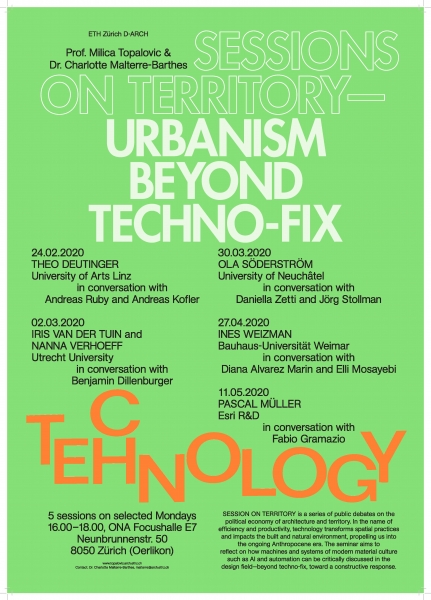Critical Thinking
Urbanism Beyond Technofix, Sessions on Territory
"A comic faith in technofixes, whether secular or religious: technology will somehow come to the rescue of its naughty but very clever children," Donna Haraway, Staying with the Trouble (Durham: Duke Press, 2016), 3.
In the name of efficiency and productivity, technology transformed spatial practices and impacted the built and natural environment, propelling us into the ongoing Anthropocene era. The seminar aims to reflect on how machines and systems of modern material culture such as AI and automation can be critically discussed in the design field—beyond techno-fix, toward a constructive response. From the mobile applications that micromanage our lives and guides us through the streets of our cities, to the mechanic slaves that undertake our domestic chores; from the machine learning tools that devise our parking lots and towns, to satellite-controlled global geo-engineering projects, technology has penetrated all scales of spatial practices in myriad ways. In an attempt to grasp what are the consequences for the built environment and which forms could constructive responses take, focus is set on two subjects.
First, does technology have politics? This thorny question was examined in the 1980s by Langdon Winner and remains a central concern today. For instance, large chunk of data is consistently fed to systems that physically affect people’s lives, embodying “specific forms of power and authority.”1 How neutral is the data used for predictive policing systems, and what are the impacts of such methodology on urban environments? In what ways is new technology deployed to control and repress, and can it be subdued? When high-tech industries are touting a so-called ‘Smart Urbanism’ and the promise of technological governance, what does it entail for cities and populations? What could be the response to this neo-liberal and dysfunctional yet trending model? Such explorations lead to another question: how can architects and designers respond to the fundamentally problematic fact that technological progress is a dis-equilibrating process? If it is true that every technological solution, in turn, creates problems that need to be fixed through further technological development, can we mine history to reassess these failing paradigms, for instance by making visible the complex circuit and forms of connections behind technology? Finally, can the powerful tools at the disposal of architects such as City Engine adjust to the challenges of the Anthropocene era, toward a more democratic and responsible form of strategic practice? With these questions, we aim to reflect on how machines and systems of modern material culture such as AI, CAD and various forms of automation can be critically discussed in the design field—beyond techno-fix, toward a constructive response.
The "SESSIONS ON TERRITORY" is a series of public debates on the political economy of architecture and territory hosted by the Chair of Milica Topalovic at ETHZ. In the name of efficiency and productivity, technology transforms spatial practices and impacts the built and natural environment, propelling us into the ongoing Anthropocene era. The seminar aims to reflect on how machines and systems of modern material culture such as AI and automation can be critically discussed in the design field—beyond techno-fix, toward a constructive response.
Every intervention by a guest speaker is followed by a panel discussion with invited respondents.
24.02.2020
THEO DEUTINGER
University of Art and Design in Linz
in conversation with Andreas Ruby and Andreas Kofler
02.03.2020
IRIS VAN DER TUIN AND NANNA VERHOEFF
Utrecht University
in conversation with Benjamin Dillinburger
30.03.2020
OLA SÖDERSTRÖM
Université de Neuchâtel
in conversation with Daniella Zetti and Jörg Stollman
27.04.2020
INES WEIZMAN
Bauhaus-Universität Weimar
in conversation with Diana Alvarez Marin and Elli Mosayebi
11.05.2020
PASCAL MÜLLER
Esri R&D
in conversation with Fabio Gramazio
Selected Mondays, 4 — 5.30 pm, ONA Focushalle, ETHZ.
2020, curated by Charlotte Malterre-Barthes, for Prof. Milica Topalovic, ETHZ.
- More Critical Thinking Seminars
- Homes on Fields
- Mapping the Political Economy of Space
- Material World
- Critical Space
- MUCEM
